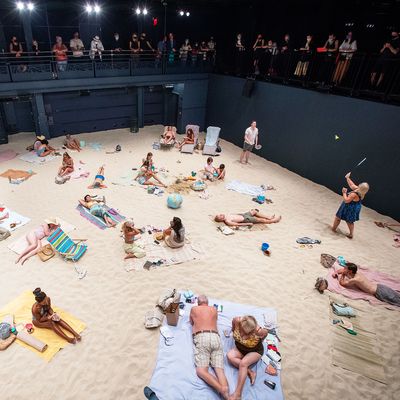
Watching someone else’s vacation has gone, in the past two years, from difficult to excruciating. That’s one of the sharp little knives wielded by Sun & Sea, the long-duration opera at BAM’s Fishman Space this weekend. For the five-hour production (once you enter, you can stay or go as you please), the stage has been transformed into a realistic beach with 25 tons of sand spread from wall to wall. To see it, the audience must go to the balcony level of the small theater and stand high above the stage on all four sides, like visitors in an operating theater or technicians in the flies. We have to hang enviously over a railing to see the beach below, and there’s something about that posture — so different from the theatergoer’s usual princely seated position — that makes us seem like poor relations, wallflowers who have to eavesdrop on the pleasures of others.
The Lithuanian director and set designer Rugilė Barzdžiukaitė has packed the beach with bodies, all reading and snacking and whiling the time away, a row of deck chairs forming one corner, a beach umbrella tossed into another. Thirteen are vocalists; the rest are supernumeraries ready to mill around and kick sand. The cast’s behavior, naturalistic and constantly changing (even as Vaiva Grainytė’s libretto itself does repeat on an hour-long loop), operates at a slow, vacation-day pace. A couple discusses whether it’s time to go in the water. Children chatter and play. A dog is taken (dragged) for a walk. And as the people laze on their pastel towels, they also sometimes sing.
The songs are usually short glimpses into a sun-drowsy person’s mind: a man thinking about how he met his lover, or a workaholic anxious about whether exhaustion is actually a real concern. Grainytė’s lyrics have been translated into English, but it’s still tricky understanding the voices as they follow Lina Lapelyte’s unmelodic, hopscotch compositions. Sometimes the language is crystal clear — a man remembers the volcano that interrupted his vacation plans, and we hear each word — other times we need to check the printed libretto to understand. Lapelyte’s sounds are unfailingly chimelike and calm, so it comes as a surprise that some of the thoughts are heated, even frightened. “Our swimsuits are filling up with algae!” the whole room sings in chorus, complaining that the ocean is turning green, blooming with eutrophication. As the sound washes over you, it’s easy to miss that the world surrounding these sun worshippers is poisoned, willful, inhospitable: “You are strongly advised to stay onshore! You should not leave your children unobserved!” The music’s dazed laziness infects them and infects us, too, so we can’t always comprehend these warnings.
Originally, Sun & Sea was a commission for the Lithuanian pavilion at the 2019 Venice Biennale. In Venice, a city literally swamped by cruise ships, the problem of the Vacation Industrial Complex would surely have been a sharp one. Time has only honed that edge: The Biennale performance was nearly a year before pandemic-era beach vacations became … what? Out of reach? Irresponsible? The only responsible kind of vacation? As they built the production, Barzdžiukaitė and her team were clearly thinking about the way “leisure” contains and erases the evidence of the disasters happening all around us, and the intervening crises have only made their points more relevant.
The joke of the title Sun & Sea is that we aren’t really seeing either one. We see sand, we seem to sense heat, but the sun and the ocean are themselves fundamentally “offstage” — they are the temptations, pressures, and threats the people take for granted. The sea is full of riptides and whirlpools — “Acidy waves, ivory foam” a woman sings, telling us about her ex-husband who drowned — and the libretto starts and finishes with a woman singing about sunscreen. “Protection for hypersensitive skin,” she sings, reading the label, and our minds drift from melanoma screenings to Hawaii and Indonesia, places where certain types of sunscreen are killing the coral reefs. Jealousy turns to revulsion: All the teeming life onstage starts to shift, under your weary eyes, into the wriggling life on a microscope slide, smashed flat by our faraway gaze. The exaggerated length of the evening is itself part of the show’s indictment — it gives us plenty of time to grow sick of humans and their litter.
The show is about questioning pleasure, and I think it’s intentional that it sort of ruins your night. Certainly, your own physical discomfort becomes part of the show after about half an hour (depending on your lumbar health); your ability to extract story, drama, and intrigue from micro-events will inform how interested you are in the events below. The music is spare, turning lush only during the collective choral moments when the whole room rings. And the more the lyrics remind you of everything that’s wrong in the world, the more the sight of such extravagant inactivity raises your hackles. Perhaps this isn’t just an opera? Maybe it’s aversion therapy for our leisure-obsessed generation? You enter the show to an image of enviable ease — and then you leave when you can’t bear it anymore.
Sun & Sea is at the BAM Fishman through September 26.





